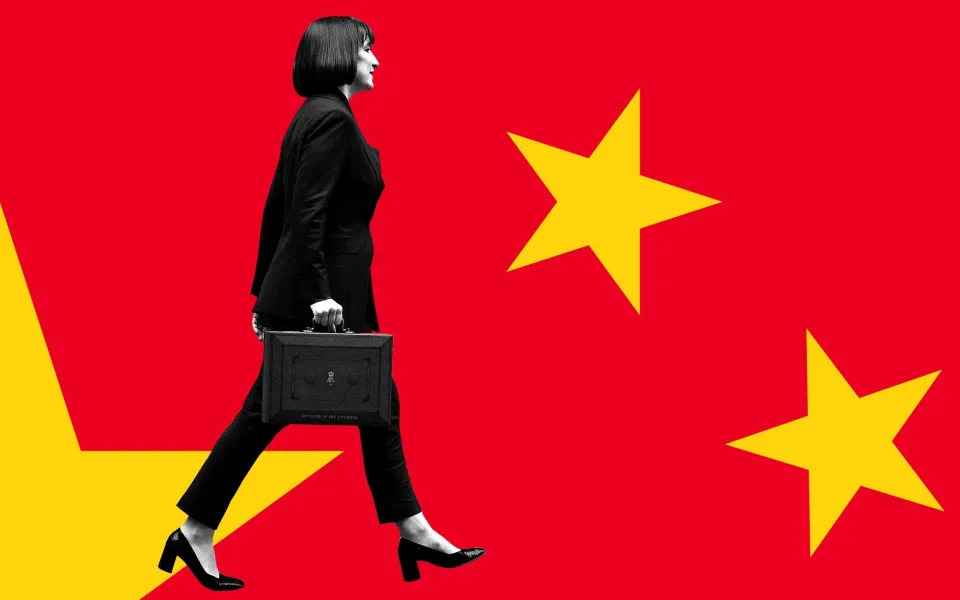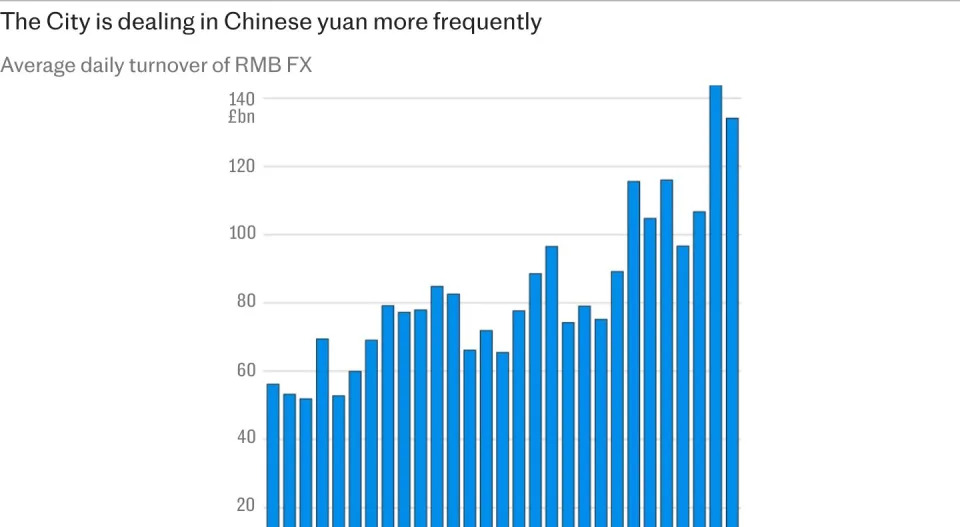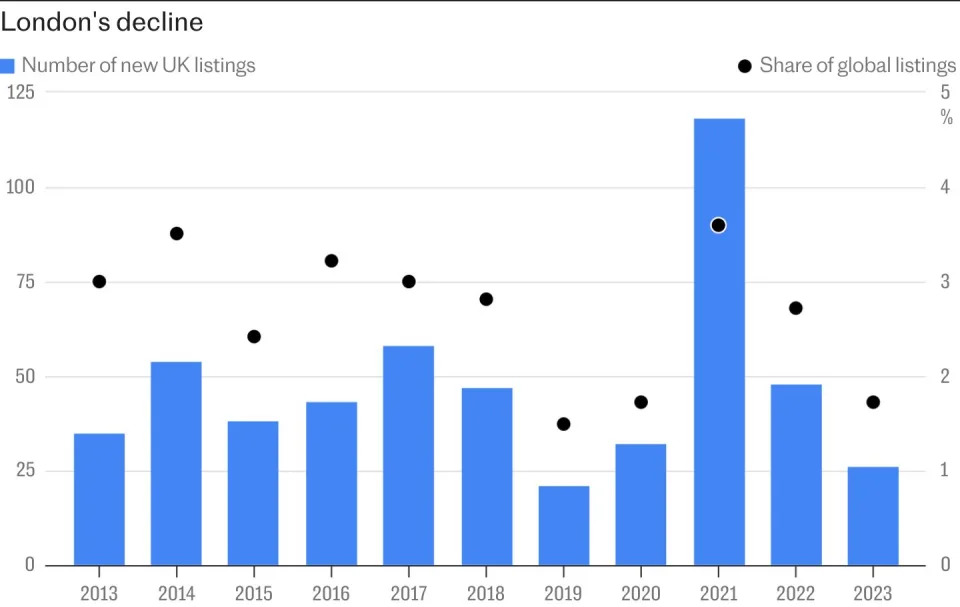News
Why Reeves ‘fled to China’ as bond markets fell into crisis

Rachel Reeves has been accused of being “missing in action” after flying to Beijing on Thursday to meet with communist officials, despite turmoil in the UK bond market.
Dame Harriett Baldwin, the shadow business minister, claimed Reeves had “fled to China” as surging bond yields put the Chancellor at risk of breaking fiscal rules she had drawn up months before.
The Treasury has insisted that the gilt market is functioning as normal and does not require any emergency intervention, leaving Reeves free to undertake her long-planned trip.
However, the fact that the Chancellor has chosen to go ahead with the visit to China rather than reassure the country and the markets is telling. It underlines the importance of the visit as the Government scrambles to find ways to boost the flatlining economy and the anaemic stock market.
Reeves will visit Beijing and Shanghai this weekend with a delegation of Treasury mandarins and business chiefs for the UK-China Economic and Financial Dialogue, a summit established in 2008 to boost relations. It was meant to be annual but last took place in 2019.
The Chancellor will meet He Lifeng, the Chinese vice-premier, to discuss closer economic links between the two countries, including tighter stock market bonds. She will also visit the Chinese branches of Brompton, Jaguar Land Rover, Unilever and Diageo as she seeks to encourage greater trade between the two nations.
Andrew Bailey, the Bank of England Governor, and Nikhil Rathi, the Financial Conduct Authority chief, are also travelling with the British delegation in a sign of the significance of the visit. Sir Mark Tucker, the HSBC chairman, will add some much-needed City star power.
Reeves’s Beijing trip is part of a broader Labour reset of UK-China relations after a period of strained engagement under the former Tory government.
It also marks a fresh opportunity for the Chancellor to try and give Britain’s financial services sector a shot in the arm, with China’s trillions representing a tantalising prize for London’s battered stock market.
“There’s just so little capital in London now that you can’t raise money. So people are saying, ‘Maybe I’ve got to go to China,’” says Andrew Monk, the chief executive of stockbroker VSA Capital, which has offices in London and Shanghai.
Attracting more cash to the City of London could help boost Britain’s flatlining growth rate – a major priority for Reeves as economic concerns stoke the rise in gilt yields .
The Chancellor said last night: “Growing the economy and raising living standards is front and centre of this Government’s Plan for Change.
“By finding common ground on trade and investment while being candid about our differences and upholding national security as the first duty of this Government, we can build a long-term economic relationship with China that works in the national interest.”
The City of London is already the world’s largest transaction hub for renminbi foreign exchange trades and the second-largest offshore renminbi payments centre in the world.
Around 52bn renminbi (£5.7bn) is cleared in the capital every day, according to figures from the City of London Corporation.
This is partly due to the presence of China Construction Bank’s London branch, the largest renminbi offshore clearing banking in the world, but also because of London’s international profile and time zone.

Financial services are the UK’s largest services export to China outside of travel, accounting for £1.6bn of annual trade, according to the Office for National Statistics. However, this was down by 9pc versus the prior year, mirroring a wider fall in the trade between the two countries.
Monk says there had been more interest in China from his UK clients over the past few months, perhaps reflecting the changing mood music in Westminster.
“There is a bit of a thawing of that very anti-Chinese feeling just after Covid,” he says.
“Most of the companies we dealt with were saying ‘we don’t want to go to China’ because they might upset some of their Western counterparts. There was very much [a feeling of] ‘we don’t want to go to China’.
“But the last three to four months there has been less than that. Suddenly we’re getting people ringing up saying ‘we need to get to China’ or ‘we’re talking with this Chinese counterpart’.”
According to a leaked draft memo, a central topic of conversation between Reeves and Chinese officials will be reviving the much-maligned Shanghai-London Stock Connect.
The project, which was the brainchild of George Osborne, the former chancellor, was set up to allow the easier listing of UK company shares on the Chinese stock market and vice versa.
Huatai Securities, China Pacific Insurance Company and SDIC Power Holdings, a state-backed utility, listed shares in London using the mechanism after its initial launch. But they are among six Chinese companies to have done so since the programme launched in 2018, while no London-listed companies have chosen to list shares in Shanghai.
The link struggled to gain traction amid a souring of relations between the two countries after the “golden era” ushered in by former prime minister David Cameron came to an end.
Hardening Communist Party rule under Xi Jinping, including greater control over Hong Kong, and fears of Chinese spying in the UK has prompted increased scepticism in Westminster .
In recent defence reviews, the Government described China as a “systemic competitor”.
In 2022, the Government forced Chinese-owned manufacturer Nexperia to sell a stake in a key microchip factory in Newport on national security grounds. It also bought out China General Nuclear’s stake in the Sizewell C nuclear plant owing to security concerns.
Alicia Kearns, a former foreign affairs and national security committee member, says: “You cannot sacrifice national security on the altar of economics and we are mistaken if we think China’s economy does not also benefit from relations with us.”
The attitude in the City is more sanguine. As one senior City figure puts it: “Capital has no nationality, it just drives things and we need more energy in the UK.
“People say they don’t trust the Chinese – but why would we not trust the Chinese but trust the Americans or the Germans? Every nation is looking out for their own interests. China is no different to that.
“American capital has a great deal of American government attachment to it for example – that’s what countries do. China is no different to anywhere else.”
Reviving and making a success of the Shanghai-London Stock Connect could provide a substantial boost to Britain’s struggling stock market, as would attracting more Chinese capital into the UK.
Fresh data published this week shows that British-focused investment funds suffered the highest level of withdrawals on record last year, with £9.6bn of outflows.
In total, £45bn has left UK funds over the past decade, while the portion of assets invested in UK stocks by British pension funds has dropped from 53pc in 1997 to 4.4pc.
Not only would new listings improve the vitality of the market at a time when it is struggling to attract new companies but it may help to draw in more Chinese capital.

Monk says: “The Chinese policy is if you want to go and buy a company in England, then go do it right because it’s a beachhead. China is now allowing money to flow out of it to get strategic positions in certain industries outside of China.”
Reeves’s Chinese trip also comes against the backdrop of a possible London listing of fast-fashion retailer Shein. The company has filed for a blockbuster £50bn London flotation , despite concerns over its ethical record.
If it goes through, other big Chinese companies could be encouraged to explore a listing in London, particularly if New York shuts its doors as Donald Trump takes power in Washington.
However, doubts about whether Shein will follow through with the listing were fuelled this week by a testy session of the Commons business and trade select committee.
MPs said answers given by Yinan Zhu, Shein’s general counsel for Europe, Middle East and Africa, “bordered on contempt” after she dodged questions about whether forced labour exists in her company’s supply chain.
For campaigners who have warned over China’s growing crackdown in Hong Kong, the Government’s bid to boost economic ties puts Britain’s interests at risk.
Reeves’s trip comes days before Trump’s inauguration and trying to lure more Chinese capital into the UK could complicate US relations.
Britain’s links with China have caused problems in the past. Britain’s telecoms industry already suffered a damaging hit after the US turned against Huawei. Washington leaned on the UK to follow suit, ultimately forcing billions of pounds of equipment to be ripped out of the UK infrastructure.
As Reeves travels to Beijing, her gamble on China helping to revive Britain’s stock market and boost growth looks high-risk at best. And as the bond market turmoil continues at home, the Chancellor is open to the charge that she is “missing in action”, as Mel Stride, the shadow chancellor, said this week.
Broaden your horizons with award-winning British journalism. Try The Telegraph free for 1 month with unlimited access to our award-winning website, exclusive app, money-saving offers and more.

